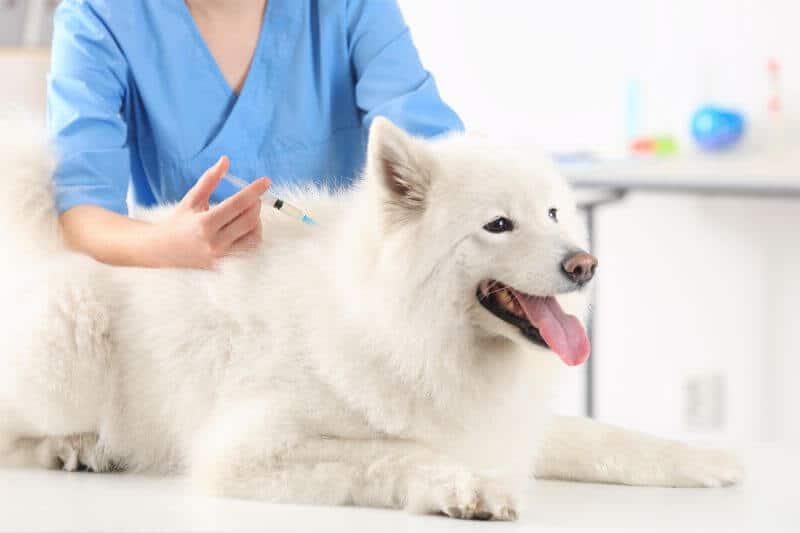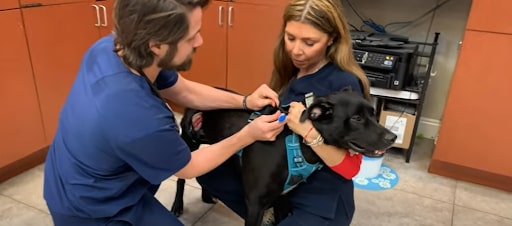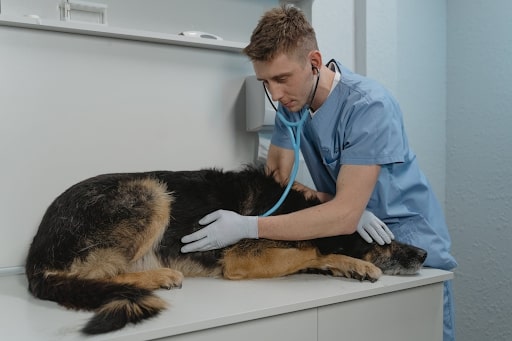Over the past years, I have had the chance to work with multiple licensed veterinarians. One of them, Leslie Brooks, DVM, was kind enough to share her knowledge and years of experience. This post tells everything about vet costs for dogs and gives cost estimates to treat some of the most common health problems. You will also learn how often you should take your dog to the veterinarian and what type of preventive care should be done.
A dog owner can expect preventive care expenses between $315 and $885 for the first year with a puppy and between $240 and $1,075 yearly for an adult dog. Prices will vary depending on location, medical acts performed, and the clinic. Parasite prevention is usually the most expensive part.
The idea isn’t to give exact numbers, but more of a reasonable range and an idea of what to expect during vet visits. We will also share tips to keep your pet healthy and save money along the way.
Also, know that medical costs are only a small portion of the total cost of owning a dog.
Before & After you Get a Puppy (2 eBooks)
+ Our Dog Supplies Checklist
+ Discounts & Coupons
FOR FREE
It is best to take a puppy to the veterinarian at least three times during the first year. After that, a yearly preventive visit for adult dogs is also recommended. Dogs suffering from medical problems could be required to go to the clinic more frequently.
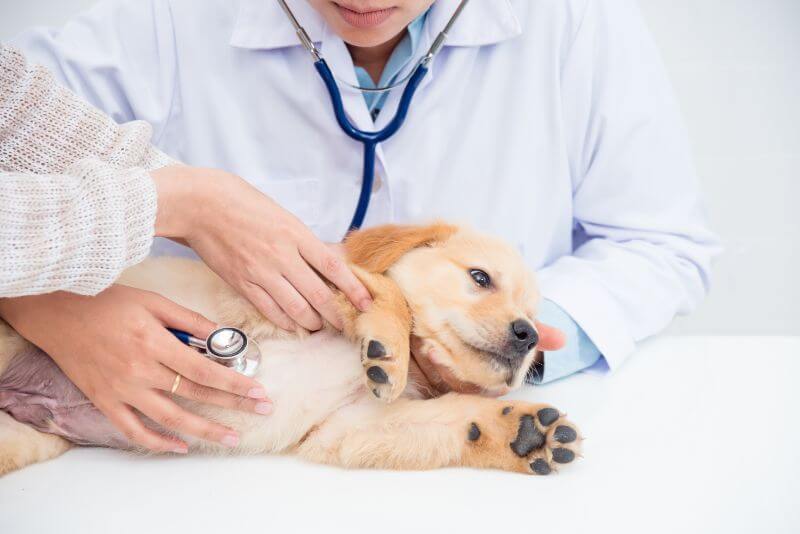
Related: Dog MRI Cost: Why Prices Vary and What Can You Do About It?
Preventive care for a puppy
Puppy exams
The first veterinary exam should be either when the puppy is acquired or at 5-6 weeks of age (sooner if the puppy was born in the home and if there are concerns). The two other exams during the first year will be planned according to the vaccine schedule.
Dr. Brooks’ opinion: puppies should see the vet at least three times during their first year of life.
Estimated cost: each exam should cost between $30 and $50. Some clinics even offer a free first examination.
Puppy vaccination
Distemper virus, parvovirus, adenovirus, and parainfluenza virus vaccines are given in a combination vaccine starting at 6-8 weeks of age and then every 2-4 weeks until the puppy is 14-16 weeks of age. This is to make sure they get full protection as the maternal antibodies wane.
Dr. Brooks’ opinion: highly recommended
Estimated cost: $15 – $30 per dose
Bordatella (kennel cough) vaccine is given when a puppy is at least 8-9 weeks of age and does not need a booster shot until the following year.
Dr. Brooks’ opinion: highly recommended
Estimated cost: $15 – $20
The rabies vaccine is given when a puppy is at least 12 weeks of age and does not need a booster shot until the following year.
Dr. Brooks’ opinion: highly recommended (usually required by law)
Estimated cost: $15 – $20
Leptospirosis vaccine is given when the puppy is at least 12 weeks of age. It’s a lifestyle vaccine, essential if the dog is exposed to wildlife, go camping, hiking, or plays in puddles, lakes, ponds, etc. Many vets give this vaccine combined with the core vaccine (distemper, parvo, adeno, parainfluenza).
Dr. Brooks’ opinion: highly recommended
Estimated cost: $15 – $25 unless it’s already included with the core vaccine
Influenza vaccine is given when a puppy is at least eight weeks of age. A booster shot is required 2-4 weeks later, and then yearly. It’s a lifestyle vaccine, essential if the dog goes to a doggie daycare or is kenneled or boarded often, and if the daycare or kennels requires it due to intermittent influenza outbreaks.
Dr. Brooks’ opinion: up to the dog owner
Estimated cost: $35 – $45 per dose
Lyme vaccine is given when a puppy is at least 12 weeks of age. A booster shot is required 2-4 weeks later, and then yearly. It’s a lifestyle vaccine, vital if the dog is often exposed to ticks (goes camping, hiking, or living in a wooded area or on a farm, for example).
Dr. Brooks’ opinion: up to the dog owner
Estimated cost: $30 – $40 per dose
Puppy deworming and fecal examination
Puppies should be dewormed at 2, 4, 6, and 8 weeks of age with Pyrantel Pamoate. This is an oral liquid they are given based on their weight. A fecal exam is then done to check for any remaining parasites and determine if subsequent dewormings are needed.
Dr. Brooks’ opinion: deworming is essential to reduce parasites and improve your pet’s health. It should be done before the puppy is bought or adopted.
Estimated cost: $10 – $15 per dose (deworming) + $40 -$50 for fecal examination
Puppy heartworm prevention
Heartworm medication is given once a month either as a topically applied liquid, or an oral chewable tablet or pill, depending on which product the vet recommends, and the owner prefers. Usually, it is recommended to buy one dose at a time until the puppy is fully grown (the medication dosage is based on the dog’s weight) and then purchase a 6 to 12 months supply to save money.
Dr. Brooks’ opinion: heartworm medication is essential to prevent the development of heartworm disease.
Estimated cost: $50 – $150 for the first year, depending on the dog’s weight and brand used. The first dose is sometimes offered for free at the clinic.
Puppy flea and tick prevention
Flea and tick medication is given once a month either as a topically applied liquid, or an oral chewable tablet or pill, depending on which product the vet recommends, and the owner prefers. Usually, it is recommended to buy one dose at a time until the puppy is fully grown (the medication dosage is based on the dog’s weight) and then purchase a 6 to 12 months supply to save money.
Dr. Brooks’ opinion: fleas and ticks are not just a nuisance. They are a real threat to your dog’s health, making prevention very important.
Estimated cost: $70 – $150 for the first year, depending on the dog’s weight and brand used. The first dose is sometimes offered for free at the clinic.
Spay or neuter
It is recommended to spay (female) or neuter (male) when dogs are at least 4-6 months of age. Newer recommendations for large breeds are to wait until they are closer to 1 year of age before spaying and neutering. Some evidence has suggested this can help decrease the risk for bone and joint abnormalities and cancer later in life. However, spaying before the first heat cycle drastically reduces mammary cancer risk later in life for females.
Dr. Brooks’ opinion: up to the dog owner but typically recommended
Estimated cost: $100 – $500 depending mostly on the dog’s size and clinic. Spaying is typically more expensive. There are low-cost clinics that may spay or neuter for as low as $50.
Gastropexy (large puppies only)
A gastropexy procedure is recommended for large, deep-chested dogs to be performed at the time of their spay or neuter to help prevent Gastric Dilatation and Volvulus (GDV) later in life. GDV is when the stomach twists on itself and is a life-threatening condition that must be corrected with surgery.
Dr. Brooks’ opinion: up to the dog owner
Estimated cost: $200 – $400 when performed during the spay or neuter procedure
MDR1 DNA test (specific breeds only)
A DNA test for the MDR1 gene mutation (multiple drug sensitivity screening) could be useful for the following breeds: Collie, Australian Shepherd, Border Collie, Miniature American Shepherd, Bearded Collie. If the dog’s parents haven’t been tested for this, it is useful information to know before any surgical procedure and prescribing certain medications throughout the dog’s life.
Dr. Brooks’ opinion: up to the dog owner
Estimated cost: $55 – $65
Breed and health DNA test
There is a way to evaluate the risk of many genetic health conditions to start preventive care early on and plan for potential significant expenses. Along with Cornell University, Embark‘s veterinarians have developed a DNA test kit that enables them to evaluate the risk of over 190 health conditions. Embark is the most accurate and comprehensive dog DNA test on the market. It also tests for over 350 dog breeds.
Dr. Brooks’ opinion: up to the dog owner
Estimated cost: $150 – $200
Puppy medical costs recap
| Puppy medical costs | Cost estimate |
| Exams (x3) | $120 – $150 |
| Core vaccine (x3) | $45 – $90 |
| Bordatella vaccine | $15 – $20 |
| Rabies vaccine | $15 – $20 |
| Leptospirosis vaccine | $0 – $25 |
| Influenza vaccine (x2) | $0 – $90 |
| Lyme vaccine (x2) | $0 – $80 |
| Deworming (x4) | $0 – $60 |
| Fecal exam | $0 – $50 |
| Heartworm medication | $50 – $150 |
| Flea and tick medication | $70 – $150 |
| First-year total | $315 – $885 |
| Spay or neuter | $100 – $500 |
| Gastropexy | $200 – $400 |
| MDR1 DNA test | $55 – $65 |
| Breed and health DNA test | $150 – $200 |
A preventive vet visit for a puppy will cost between $45 and $235, depending on the vaccines and exams performed. There should be three visits during the first year. This does not include heartworm, flea, and tick prevention ($120 to $300 for the first year), or a spay/neuter ($100 to $500).
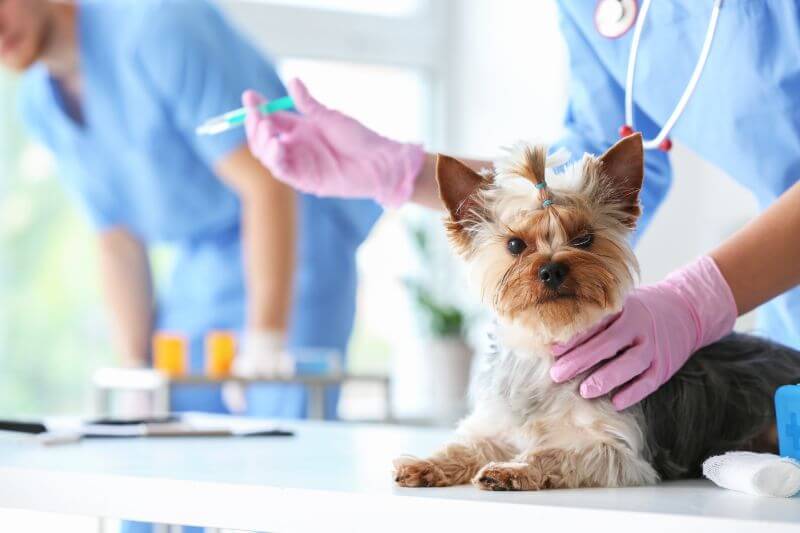
Related: Luxated Patella of Dog – Surgery Cost
Preventive care for an adult dog
Vet exams
An adult dog should be seen by a veterinarian at least once a year for preventive healthcare.
Dr. Brooks’ opinion: highly recommended
Estimated cost: $40 – $50
Adult dog vaccination
Distemper virus, parvovirus, adenovirus, and parainfluenza virus vaccines can be given once every three years after the dog is one year of age, assuming it received all of its proper puppy boosters.
Dr. Brooks’ opinion: highly recommended
Estimated cost: $15 – $30
Bordatella (kennel cough) vaccine is usually given yearly (some kennels or dog daycares require it every six months).
Dr. Brooks’ opinion: recommended
Estimated cost: $15 – $20
The rabies vaccine is given yearly or every three years, depending on whether a one-year or three-year rabies vaccine was used.
Dr. Brooks’ opinion: highly recommended (usually required by law)
Estimated cost: $20 – $30
Leptospirosis vaccine is given yearly. Many vets provide this vaccine combined with the core vaccine (distemper/parvo/adeno/parainfluenza).
Dr. Brooks’ opinion: highly recommended
Estimated cost: $15 – $25 unless it’s already included with the core vaccine (the core vaccine is only given once every three years for an adult dog, though)
Influenza vaccine is given yearly (unless the puppy didn’t get it, in which case a booster shot will be needed after 2 to 4 weeks).
Dr. Brooks’ opinion: up to the dog owner
Estimated cost: $35 – $45
Lyme vaccine is given yearly (unless the puppy didn’t get it, in which case a booster shot will be needed after 2 to 4 weeks).
Dr. Brooks’ opinion: up to the dog owner
Estimated cost: $30 – $40
Dog heartworm prevention
Heartworm medication is given once a month either as a topically applied liquid, or an oral chewable tablet or pill, depending on which product the vet recommends, and the owner prefers.
Dr. Brooks’ opinion: heartworm medication is vital to prevent the development of heartworm disease.
Estimated cost: $50 – $250 for the year depending on the dog’s weight and brand used.
Dog flea and tick prevention
Flea and tick medication is given once a month either as a topically applied liquid, or an oral chewable tablet or pill, depending on which product the vet recommends, and the owner prefers.
Dr. Brooks’ opinion: fleas and ticks are not just a nuisance. They are a real threat to your dog’s health, making prevention very important.
Estimated cost: $100 – $400 for the year depending on the dog’s weight and brand used.
Fecal examination
A yearly fecal exam could be recommended if the pet is regularly exposed to other dogs or wildlife or has inconsistent stool quality.
Dr. Brooks’ opinion: up to the dog owner
Estimated cost: $40 – $50
Heartworm test
A yearly heartworm test can be performed to make sure the dog doesn’t suffer from heartworm disease and continue giving heartworm prevention medication safely. If the dog has missed doses of heartworm prevention, a test must be performed to ensure it can continue to receive heartworm prevention safely and without risk of an adverse reaction.
Dr. Brooks’ opinion: highly recommended
Estimated cost: $35 – $45
Healthscreen bloodwork
A yearly blood test can help detect any hidden medical condition and start treatment before it’s too late.
Dr. Brooks’ opinion: up to the dog owner, but recommended for middle-aged and senior dogs
Estimated cost: $75 – $90
Adult dog medical cost recap
| Adult dog medical costs | Cost estimate |
| Exam | $40 – $50 |
| Core vaccine | $0 – $30 |
| Bordatella vaccine | $15 – $20 |
| Rabies vaccine | $0 – $30 |
| Leptospirosis vaccine | $0 – $25 |
| Influenza vaccine | $0 – $45 |
| Lyme vaccine | $0 – $40 |
| Heartworm medication | $50 – $250 |
| Flea and tick medication | $100 – $400 |
| Fecal exam | $0 – $50 |
| Heartworm test | $35 – $45 |
| Bloodwork | $0 – $90 |
| Yearly total | $240 – $1,075 |
A preventive vet visit for an adult dog will cost between $90 and $425, depending on the vaccines and exams performed. This does not include heartworm, flea, and tick prevention ($150 to $650 for the year depending on the dog’s weight).
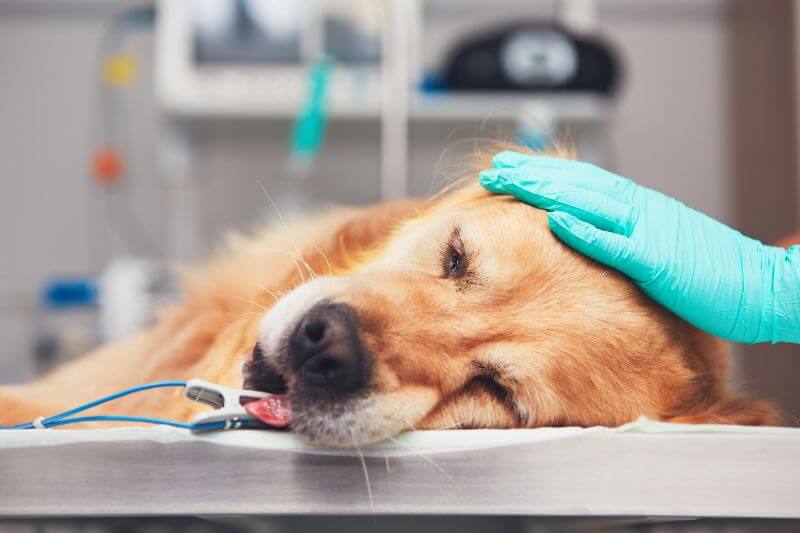
Related: How Much Does It Cost to Clone a Dog?
Some common health issues for dogs
On top of preventive care, your dog could need expensive medical treatments and procedures following an illness or condition diagnosis. Here are the most common medical problems according to our consulting licensed veterinarian, Leslie Brooks, DVM. I have asked her opinion on 151 types of dogs (purebred and mixed-breeds) to establish this list.
The first column is the name of the medical problem. The second column is the percentage of dog breeds for which it is considered a risk. The third column is a cost estimate to treat this problem (can vary depending on many factors).
| Condition | Breeds at Risk | Cost Estimate |
| Allergies | 53% | $100 – $2,000 per year |
| Dental disease | 39% | $400 – $800 |
| Patellar luxation | 39% | $300 – $2,000 |
| Cancer | 29% | $500 – $10,000 |
| Hip dysplasia | 26% | $500 – $6,500 per hip |
| Cranial cruciate ligament injury | 24% | $2,000 – $4,000 |
| Gastric dilatation and volvulus | 22% | $1,500 – $3,000 |
| Mitral valve disease | 20% | $300 – $2,000 |
| Hypothyroidism | 19% | $350 – $800 |
| Cataracts | 14% | $1,500 – $3,000 |
| Epilepsy | 13% | $500 – $2,500 |
| Arthritis | 13% | $50 – $500 per month |
| Elbow dysplasia | 11% | $2,000 – $3,500 |
| Intervertebral disc disease | 9% | $250 – $4,000 |
| Collapsing trachea | 9% | $250 – $4,500 |
| Entropion, ectropion | 9% | $800 – $1,500 |
| Otitis externa (ear infection) | 7% | $150 – $300 |
| Addison’s disease | 7% | $1,000 – $3,500 |
| Cardiomyopathy | 7% | $600 – $3,000 |
| Glaucoma | 7% | $300 – $1,500 |
| Progressive retinal atrophy | 7% | $300 – $800 |
| Dilated cardiomyopathy | 5% | $600 – $2,000 |
| Portosystemic liver shunt | 5% | $2,000 – $5,000 |
| Bladder stones | 5% | $300 – $1,500 |
| Heart disease | 5% | $800 – $2,500 |
Related: Breaking Down the C-Section for Dog Cost: What to Expect
You can go to our breed directory page, click on your favorite(s) breed(s), and get great information in the medical costs section to know what applies to your dog and have more details.
As you can see, some medical problems can be expensive to treat. Although purebred dogs may have a higher incidence of inherited disorders, mixed breed dogs are also likely to develop health conditions, such as cancer and heart disorders. No dog owner should have to make critical decisions about their pets based on their ability to afford care. That’s why pet insurance is more popular every year in the US.
Related: TPLO Surgery for Dog Cost
Pet insurance
If you wonder whether or not you should get pet insurance, we have a simple step by step guide to help you make the decision. This could save you thousands of dollars.
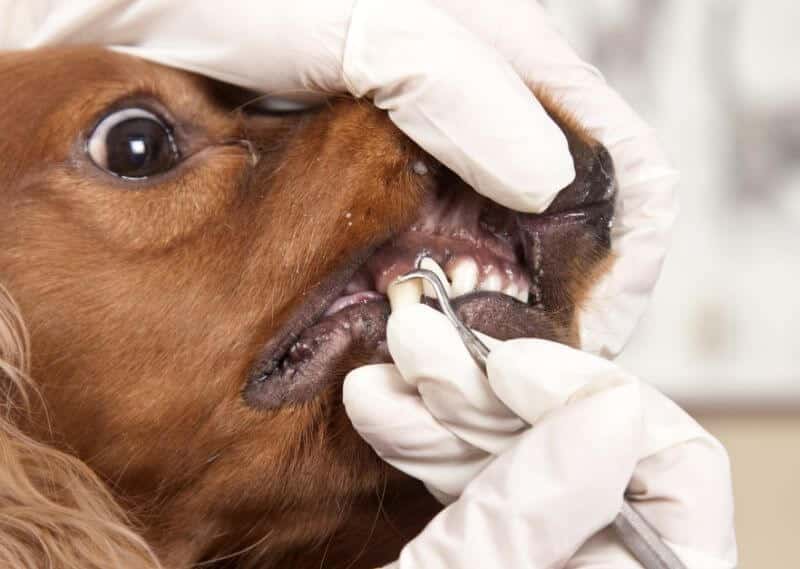
Related: How Much Does It Cost to Put a Dog Down?
Seven simple tips to keep your dog healthy
Here are seven simple tips that will help you keep your dog healthy and will hopefully drive your medical costs lower at the same time:
- Food: Consult your vet about your dog’s diet. As for humans, food is an essential part of health, and processed food can be detrimental to your pet’s health. Also, an overweight dog is more at risk to have health problems. You should be able to feel your dog’s ribs through a slight fat cover.
- Exercise: Keep the dog mentally and physically active with daily walks, outdoor time, playtime, and various toys (see my favorite dog toys here). If your dog is slowing down on walks, is reluctant to climb stairs or jump, can’t seem to get comfortable, or is less active than usually, it could be a sign of pain which should be treated as early as possible.
- Grooming: Brush your dog’s hair daily (or at least a few times a week) and look for potential external parasites at the same time. It will help maintain healthy skin and coat. Try to bathe your furry friend once a month and regularly take it to the groomer (or do it yourself). Cut your dog’s nails to make sure they don’t touch the ground when he’s standing up (usually every 2 to 6 weeks). Clean the eyes with cotton and water and the ears with an ear cleaning solution when necessary.
- Dental health: Try to brush your dog’s teeth at least two or three times a week (ideally once or twice a day) for two minutes at a time with a dog tooth-brush and tooth-paste. Dental hygiene is crucial for dogs, not only to avoid dental problems but for health in general. Bad breath and tartar are signs of potential problems.
- Look for change: A change in your dog’s behavior, breathing, appetite, drinking, urinating/defecating, or if your pet starts throwing up repeatedly could all be signs of an health problem. Consult with a veterinarian to discuss it.
- Vet: Don’t skip the annual visit, even if the dog seems healthy. Some conditions or medical problems aren’t obvious, especially in the early stages, and you wouldn’t want to miss something that would jeopardize your pet’s health and cost you more to treat if you find out about it later.
- Emergency plan: Ideally, every owner should know basic first-aid techniques for dogs, have an emergency kit, and the contact info for an emergency clinic and poison control helpline.
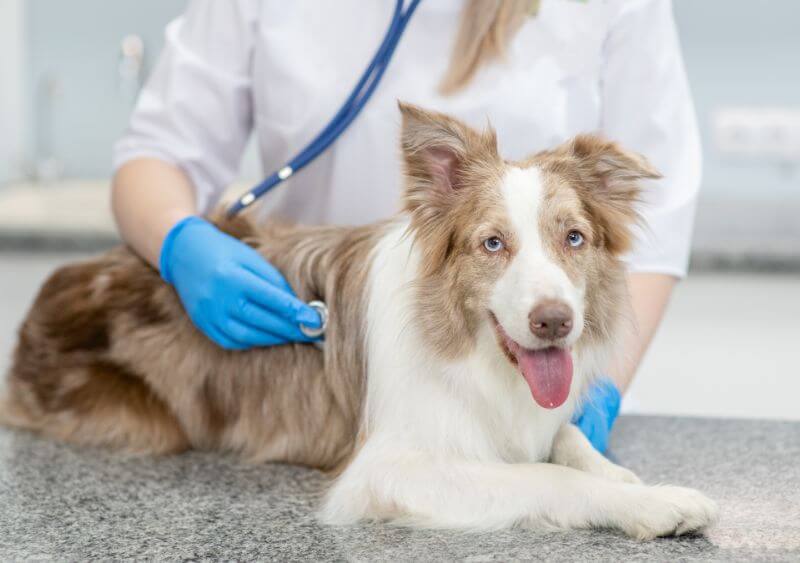
Related: Ultrasound Cost for Dog
Three tips to save on medical costs
Telehealth
I know vet appointments can be expensive, and it doesn’t necessarily make sense to go just for a couple of questions. If that’s what stops you, you can get instant answers with telehealth services. Vetster is an excellent option.
If you are in the US or Canada, you could get an online appointment with a vet. It’s extremely simple, and you get to pick a veterinarian in your area based on their price and reviews. So you can get your answers fast and without having to go in person.
Let’s face it; most pet owners don’t have a clue when it comes to their favorite animal’s health. If something worries us, it usually means hours of googling health symptoms ending up in needless worry, often resulting in an unnecessary visit to the clinic. The peace of mind from getting answers and knowing your dog is well taken care of is priceless. And, if you avoid one unnecessary vet visit, the service just pays for itself.
Medication
There is a good chance that your veterinarian will advise you to use heartworm, tick, and flea prevention medication. Instead of buying it directly from the vet and usually paying more, ask your healthcare professional for a prescription and purchase the products elsewhere. Your prescription can be filled in many big-boxed or pet stores. You can also buy them online for more convenience.
On top of being the most popular online dog food company, Chewy (this is an affiliate link) is also an online pet pharmacy with a large selection (hundreds of products), fast shipping, and very competitive prices! You can also use the “Autoship & Save” option to get an extra 5% to 10% discount and receive the medication when you need it.
Preventive care
Preventive care is much cheaper than curative care. Skipping a yearly vet visit can feel like you are saving money in the short term, but catching medical problems at an early stage usually generates significant savings over time. It’s best for your furry friend as well.
Related: How Much Does a Dog Cremation Cost?
More content you could like
- Should you get pet insurance? A simple step by step guide.
- How to find a puppy to buy or dog to adopt near you. We also have breed-specific information if you know what breed you are looking for (over 150 breeds available).
- Check our new dog owner guide to learn how to find a good vet, the questions to ask, and more.
- Learn more about the cost of owning a dog or look specifically for your favorite dog breed, guard dogs, hypoallergenic dogs, or dogs for an apartment.
- Find out more about essential dog supplies and tips to select the right ones for you and your dog.
- If you want to know whether to train your dog yourself or hire a professional and learn about the cost of training classes and supplies, check our article written with a certified dog trainer.
- Get two fantastic training courses for free. The first one is the guide to getting a dog, and the second one will teach you six simple dog training techniques.
- Find the price of puppies in the US for over 150 breeds.
Special thank you
I want to thank Leslie Brooks, DVM, a licensed veterinarian based in Indiana, for sharing this information.

